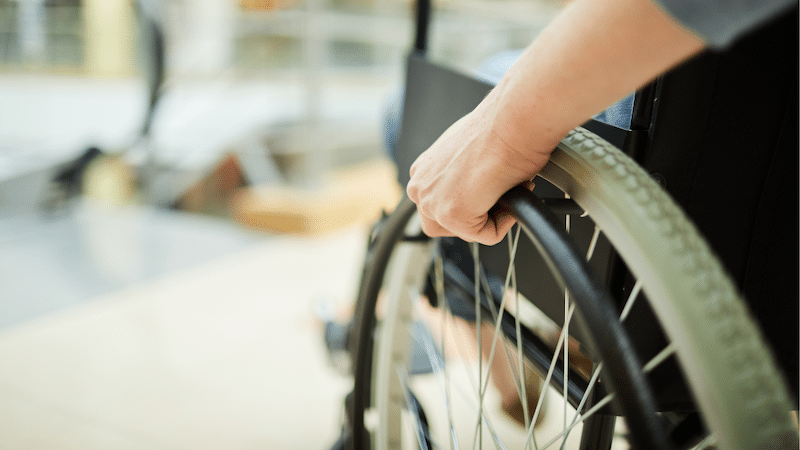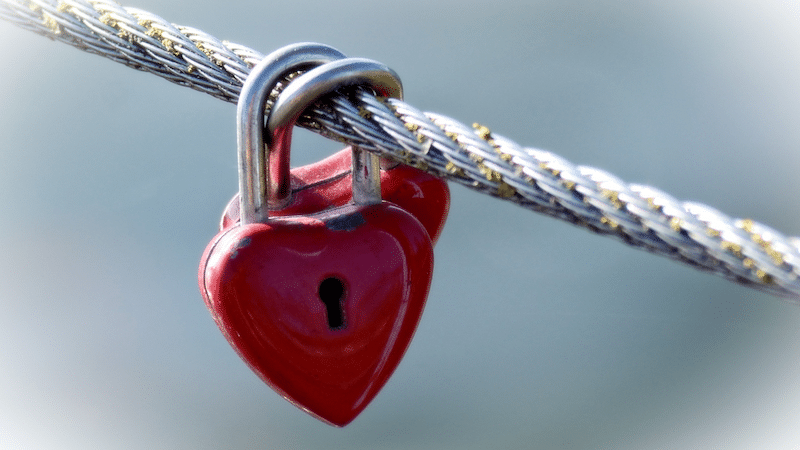What Do I Do When Someone I Know is in an Abusive Relationship?

Recognizing that someone you care about may be in an abusive relationship is painful and often overwhelming. It’s our instinct to want to help – but knowing how to do that effectively and safely can be challenging and complex. Abuse can take many forms, and leaving an abusive situation is often more complicated than it appears. On average, it takes a person approximately seven times to leave and stay away permanently from a relationship. If you’re concerned about a loved one, we have outlined signs of an abusive relationship and how you can support them in a meaningful and safe way.
Approach for supporting and helping someone in an abusive relationship:
- Recognize signs of abuse: Understanding signs of abuse can come in many forms and it is important to recognize that these signs are not a checklist or the only signs that can mark an abusive relationship. Abuse can be physical, emotional, psychological, sexual, financial, or even digital. Some warning signs can include but are not limited to:
- They are worried about making their partner angry
- They make excuses for their partner’s behavior
- Their partner is possessive and/or jealous
- They have unexplained marks/injuries
- They isolate themselves from family and friends
- Their partner puts them down in front of other people
- Create a safe space for conversation: When you feel comfortable to have a conversation, do this in a private, safe setting where the individual feels comfortable. Let them guide the conversation. Your goal is not to fix the situation, but to be present and supportive.
- Listen without judgement: Avoid interrupting, offering advice, or expressing disbelief or dramatic reaction. Survivors often minimize their own experiences, your role is to create a supportive and safe space for a survivor to open up. By listening without judgement survivors can feel understood and less alone. Some ways to be attentive without judgement include:
- Reflect on what you hear to show you’re engaged: “That sounds incredibly difficult.”
- Ask open-ended questions like: “How have you been feeling about everything?
- Validate their experiences and emotions: “You don’t deserve to be treated this way.”
- Offer support and resources: Even if you do not have the capacity to fully support a survivor or feel that you need to do more, remember that small gestures like offering to babysit, giving them a ride, or helping find a local resource can have a big impact. Helping doesn’t always mean taking big action. Sometimes, being a safe and reliable friend is enough.
- Help create a safety plan: Even if they are not ready to leave, you can help by developing a safety plan. This can include:
- Identifying a safe place to go in an emergency.
- Keeping important documents or essentials packed and hidden.
- Knowing which local services or hotlines to contact.
- Respect their decision: Do not be judgmental or critical of their decision or try to make them feel guilty for their choices. Leaving an abusive relationship is not easy. Survivors often face emotional manipulation, financial dependence, threats, and fear of escalation. It is important to:
- Not place pressure on them to leave before they are ready.
- Not criticize them for staying or returning.
- Support their autonomy and remind them that the decision is theirs to make.
- Encourage professional help and self care: Support them in accessing professionals who can offer legal, emotional, or medical help. Encourage them to speak with a counselor or a domestic violence advocate. Remind them to prioritize their own well-being and safety while also prioritizing your personal safety and well-being.
Understanding the Cycle of Abuse
Understanding this pattern can help explain why someone might stay in the relationship and why leaving is not always straightforward especially when children are involved or they have fears of retaliation. It is also important to understand that someone can have loving feelings for their abuser and it is very difficult to separate those feelings of love from their partner’s actions.
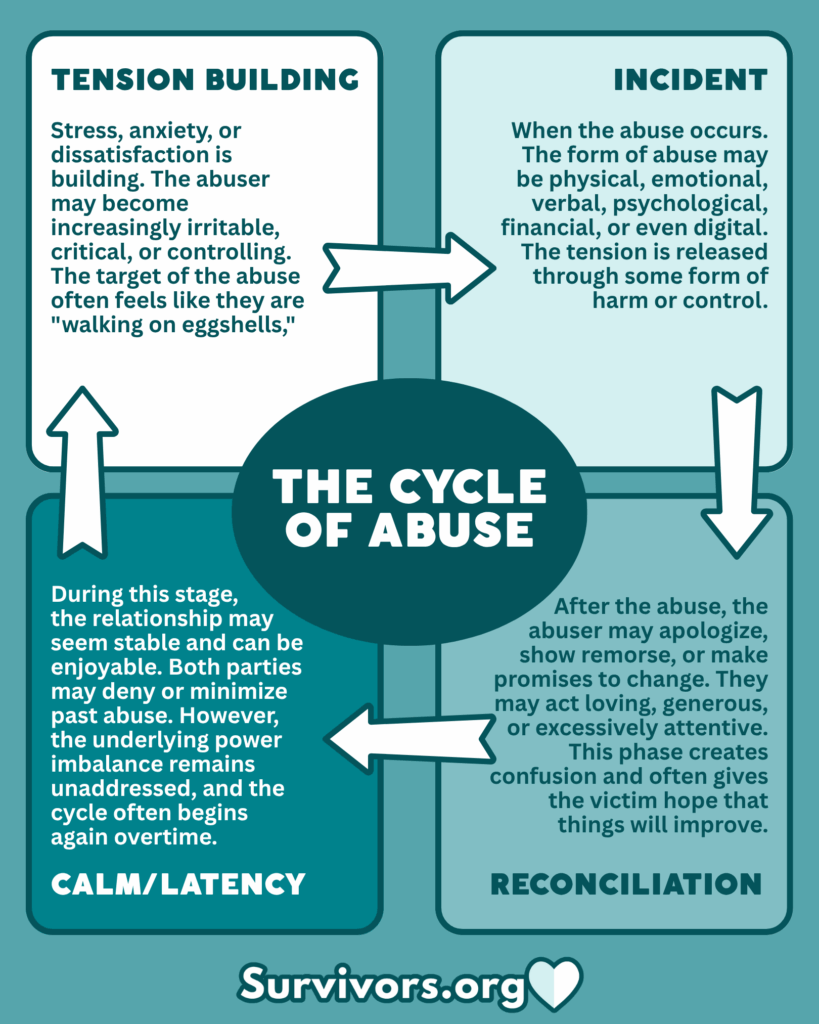
- Tension building – arguments and emotional stress escalate.
- Incident – the abusive episode occurs.
- Reconciliation – the abuser may apologize, blame stress, or promise change.
- Calm – a period of peace that often creates false hope.
The Role of Law Enforcement
While involving law enforcement might seem like the obvious step, it can sometimes escalate the situation, especially when officers are dismissive or lack proper training. In some cases, even if the survivor does not want to press charges, the state may pursue legal action, which takes control away from the survivor. It is further important to keep in mind that different communities have different opinions and experiences regarding law enforcement. It’s essential to prioritize the survivor’s sense of autonomy and only involve authorities when the person is in imminent danger or consents to do so.
Understanding the different forms of abuse that can occur in a relationship: Abuse is not always physical. Being aware of the many ways abuse can manifest will help you respond with greater empathy and awareness:
- Emotional/Psychological Abuse: Gaslighting, threats, isolation.
- Verbal Abuse: Insults, verbal assaults, raising voice.
- Coercive Control: Micromanaging behavior, restricting movement or access to resources.
- Financial Abuse: Controlling money, sabotaging employment.
- Sexual Abuse: Coercion, manipulation, or forced sexual contact.
- Digital Abuse: Monitoring phone or internet use, online harassment, blackmailing or threatening to release intimate images, videos, or private conversations.
- Honour-Based Abuse & Forced Marriage: Violence or coercion used to protect family ‘honor’.
- Abuse Related to Disability: Withholding care, using someone’s disability to manipulate and control them.
Remember: Your Wellbeing Matters Too
It is important to mirror the survivors’ language and not to label their experiences when they may not have the words to do so themselves. Pay attention to their language and gently introduce new terms without defining their experiences. Here are some examples of how to respond and create a space to provoke critical thinking that can help understand abuse and change thought processes.
- “I understand that controlling what you wear is normal in your relationship but is that something that has been normal in the past? Or what would you say to me if I told you the person I was with was controlling what I wore?”
- “What if I told you that my partner did not give me access to my income? If that happened to me I would be very upset, do you understand why that would make me upset?”
- “I totally understand that your partner would be upset about talking about this, but do you think it is appropriate for them to hurt you physically because you upset them?”
- “I am not judging you, I understand this is a person you love or care about but is how you are treated how you would treat others?”
- “There is nothing you can do that warrants or justifies physical violence.”
Supporting someone in an abusive relationship can be emotionally taxing. It’s important to acknowledge that you are not responsible for what happens inside the relationship. You may hear things that can be shocking and disturbing which can impact your emotions. Although, to a survivor this may be normal to them. Take cues from the survivor, as they may not be ready to completely open up. The most important thing is to identify yourself as a safe space.
Your presence and support can make a life-changing difference. Every small act of compassion such as listening to them vent, providing validation, and offering small gestures to make the process easier builds trust and can empower survivors to take action. Additionally, be mindful to take care of yourself during this time. Hearing that someone you love is experiencing abuse can be taxing and very emotional, it is important to take care of yourself and your own emotional wellbeing so that you can show up. Providing support means being informed, patient, and compassionate. You may not be able to change the situation, but your support can plant the seeds of change and hope for a better future.
Sources
- How to Support Someone Who is Experiencing Domestic Violence | RAINN. (2019). Rainn.org. https://rainn.org/news/how-support-someone-who-experiencing-domestic-violence?gad_source=1&gclid=Cj0KCQjwna6_BhCbARIsALId2Z3g-Dx6_0mkMYxoEjS28nBCyC5sfvjRF6r6I8fTAIqp3G142sGXAkQaAiuDEALw_wcB
- Holding Space: Three Ways to Support Domestic Violence Survivors. (2024, September 13). The Hotline. https://www.thehotline.org/resources/three-ways-to-support-domestic-violence-survivors/
- What If Someone You Know Is Experiencing Abuse. (n.d.). Jeanne Geiger Crisis Center. https://jeannegeigercrisiscenter.org/get-help/get-help-for-someone-else/
- Women’s aid. (2024). I’m not sure if my relationship is healthy. Women’s Aid. https://www.womensaid.org.uk/information-support/the-survivors-handbook/im-not-sure-if-my-relationship-is-healthy/
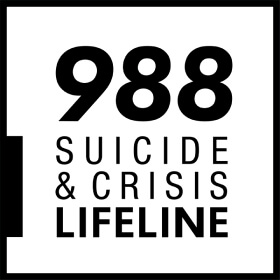
988 Suicide & Crisis Lifeline
988 Lifeline is a national network of local crisis centers that provides free and confidential emotional support to people in suicidal crisis or emotional distress 24 hours a day, 7 days a week in the United States. We’re committed to improving crisis services and advancing suicide prevention by empowering individuals, advancing professional best practices, and building awareness.
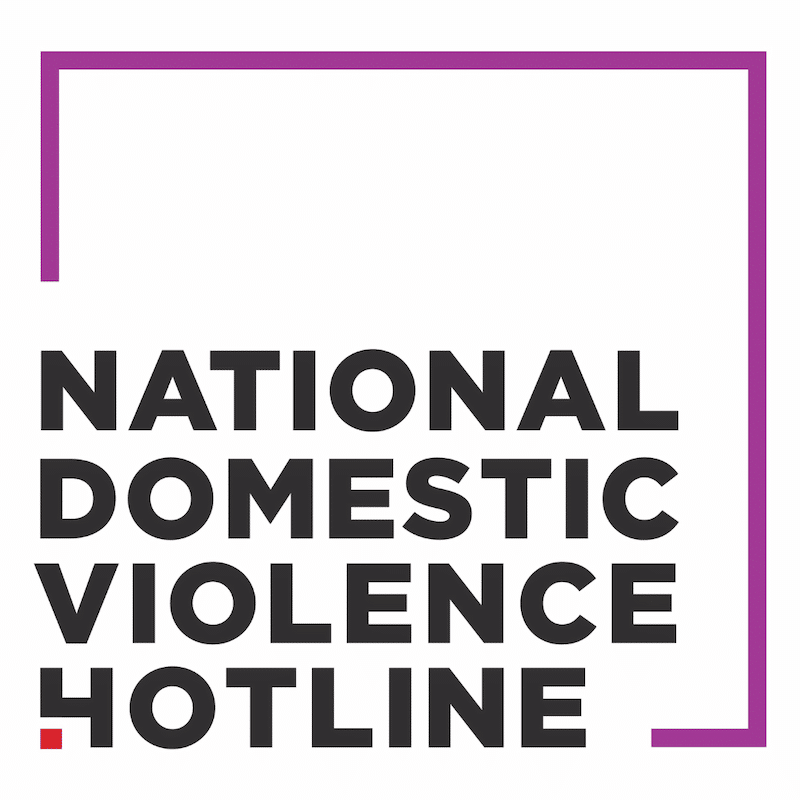
Domestic Violence Hotline
We are here to serve all those impacted by relationship abuse 24/7 confidentially. Due to high demand, you may experience longer wait times to connect with a live advocate.
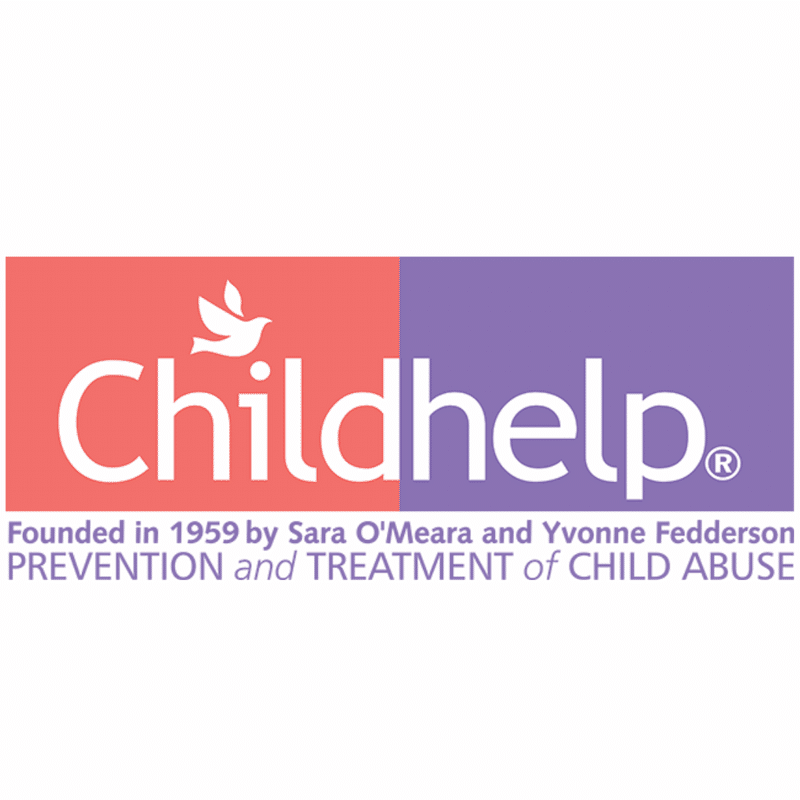
The Childhelp National Child Abuse Hotline
The Childhelp National Child Abuse Hotline is dedicated to the prevention of child abuse and has given assistance to more than 2 million help seekers. Serving the U.S. and Canada, the hotline is staffed 24 hours a day, 7 days a week with professional crisis counselors who—through interpreters—provide assistance in over 170 languages. The hotline offers crisis intervention, information, and referrals to thousands of emergency, social service, and support resources. All contacts are confidential.

